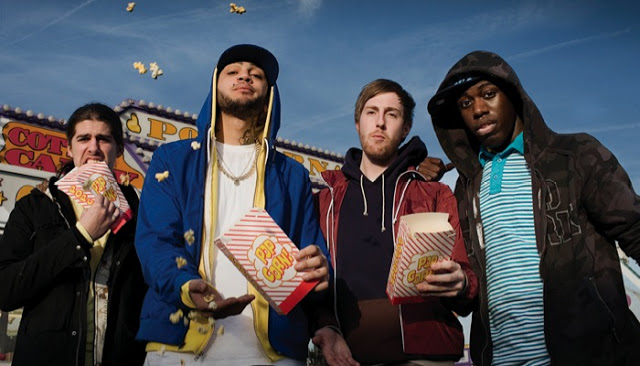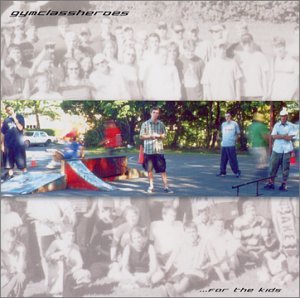In the last ten years, rap music has taken over an increasingly large section of the pop music landscape.
Recently, however, it almost seems like you have to smuggle rap onto the charts.
The hip-hop artists that are getting consistent hits these days are people like Flo Rida (who is less a rapper and more a life-support system for hooks), the Black Eyed Peas (who are a rap group in the same way that Lil Wayne is a guitar player) and Pitbull (who is… well, Pitbull).
There are exceptions, but most of the rap you hear on pop radio today is either tacked onto a non-rap song or sandwiched between catchy choruses usually sung by a pop star.
If an artist wants to do straight rap, there’s an audience for that, but if they want to go really big, they have to play by the rules of pop.
And no one knows that better than Gym Class Heroes.
You could be forgiven for not remembering the Gym Class Heroes by name.
Until 2011, they were best known for the song “Cupid’s Chokehold”, which featured a chorus taken from an old Supertramp song. Travie McCoy, the lead vocalist of the group, barely made an impression with his mush-mouthed rapping and the band that backed him was nearly invisible.
So, actually, you could be forgiven for not knowing that there was more than one person in the group.
Yes, like The Roots before them, Gym Class Heroes are the proverbial hip-hop-group-with-real-instruments.
While McCoy has said that he doesn’t consider the band to be a “hip-hop group”, their first album, released independently in 2001, is heavily focused on rap. In fact, with subsequent albums taking on a greater pop-punk/emo influence, … For The Kids is by far the most rap-centric thing Gym Class Heroes have ever produced.
Despite being produced during the heyday of rap-rock, …For The Kids is about as far from that obnoxious style of music as you can get.
Everything is done with a light touch, and even the more aggressive tracks are filled with airy guitars and snare drums.
There are a few songs, like “Happy Trees” and “Hey Mina” that have a sample-heavy, “traditional” hip-hop sound.
For the most part, though, it’s all about live instruments.
… For The Kids devotes long sections of time to the band just jamming, with a couple of tracks being full-on instrumentals.
The band continued this trend on the first Papercut Chronicles album, but by their third full-length release, any long, wordless sections had been completely excised.
It’s a shame, because one of the biggest problems in modern-day rap albums is finding a way to mix things up without including that most hated of trends, the skit.
Gym Class Heroes had a great built-in way of breaking up the monotony, but they ditched it.
They’ve still never included a skit on any of their albums, though, so that’s a plus.
The use of live instrumentation is neat, but the quality of the actual music is somewhat lacking.
Gym Class Heroes got their start performing at outdoor events like parties and BBQs, and it shows. The music on their first album sounds like it was designed for bars and street festivals. It’s unobtrusive and forgettable, music that adds a little atmosphere to a social gathering without distracting anyone.
If you took away McCoy’s rapping, this album would be so forgettable it wouldn’t even classify as music. It would just be sounds.
Which brings me to Travie McCoy.
Since the average Gym Class Heroes single contains about as much rapping as a latter-day Pitbull song, I didn’t know what to expect from an album full of McCoy’s lyricism.
But you know what? He’s all right. Very few of his lines stand out as quotable and there’s a lack of strong punch lines, but his storytelling skills are surprisingly strong. In “A Beautiful Day”, McCoy basically spends the entire song describing a nice morning, but his attention to detail—his bowl of Cinnamon Life, a Jackson 5 song playing on the stereo—underscore his wonder at life’s little pleasures.
McCoy is certainly no rapping prodigy. He has an annoying habit of ending a verse by repeating the last line multiple times, something that would continue through the rest of his career. He drops banal observations as if they’re the most profound thoughts in the world the way only a twenty-year-old can. (“The real is just fictional dreams”, “The Man ain’t nothin’ but the Klan, but not in white/They rockin’ blue and black.”)
But that’s kind of the point, isn’t it?
When looking at an artist’s early work, I try to remember that they were a lot younger when it was made.
Like I said, Travie was only twenty when he rapped on this album, and while his skills are unpolished, one thing shines through: he loves to rap. His lack of technical skill actually makes this more apparent; even if he wasn’t the best rapper, he was going to keep on rapping until he won you over.
I haven’t even mentioned Jim Paciulli, a fellow MC that joins Travie for several tracks on … For The Kids. Every time he appears, he and McCoy have an appealing back-and-forth, which, along with the music, gives this album the laid-back feeling of a bunch of kids just doing what they love.
The artists I feature in this column tend to follow a certain trajectory: they start out their career making a certain kind of music, but they eventually alter their sound to make it more pop-friendly. Some people call this “selling out,” but I try to celebrate it because I love pop music, and because people who use terms like “selling out” are jerks.
But there’s really no way around this: what happened to Gym Class Heroes is kind of sad.
It seems like Travie lived to rap when he was young, and now he’s just the guy who mumbles lyrics in between the part where Adam Levine sings. The members of the band who didn’t jump ship before the major-label debut get pushed to the background. Part of the band’s appeal early on was their combination of hip-hop and real instruments, and now you might not even know there was a band unless someone told you.
It’s only kind of sad, though.
If Gym Class Heroes had wanted to keep making the kind of music they made on … For The Kids, they could have. They could have become a fixture of the underground scene, an alternative rap group that wasn’t all that good but got a little more credit than they deserved because of how unknown they were.
But they didn’t want that. They wanted to make songs with Ryan Tedder, and hey, more power to them. They may not have the authenticity that comes with “doing it for the love,” but there’s one thing they do have:
Money. Lots and lots of money.














































































































1 Comment